
En ce vendredi, 9 août 2019, photo, employés travaillent chez Growing Home, Inc's farm dans le quartier d'Englewood à Chicago. Atlanta, Chicago et d'autres grandes villes du pays adoptent une approche à plusieurs volets pour apporter une alimentation saine aux « déserts alimentaires, " principalement des quartiers populaires situés à des kilomètres du supermarché le plus proche. Leurs initiatives incluent des stands de produits frais dans les gares de transports en commun, jardins urbains, et des partenariats avec des entreprises de covoiturage pour transporter les résidents vers les épiceries et les marchés de producteurs. L'objectif est de réduire les troubles de santé et de responsabiliser les communautés à faible revenu. (Photo AP/Amr Alfiky)
Sur le chemin de sa maison, Darnell Eleby a fait une pause avant de monter dans le train de banlieue à la gare Five Points d'Atlanta et a manœuvré son fauteuil roulant jusqu'à un arrêt que l'on ne voit pas sur de nombreuses plates-formes de transport en commun :un stand de produits frais rempli de fruits et légumes colorés. Aidé d'un bénévole, il a rempli un panier de bananes, pommes, maïs et courge et payé avec un bon de programme de santé.
"Cela vous aide quand vous ne pouvez pas vous rendre au magasin, " dit Eleby.
À Chicago, des groupes à but non lucratif ont ouvert des cliniques de santé où le personnel offre aux patients une éducation nutritionnelle et des coupons gratuits pour les marchés fermiers de la région remplis d'aliments sains. Les deux villes ont également encouragé les efforts en plein essor pour planter des jardins urbains.
Les grandes villes du pays utilisent cette approche à plusieurs volets pour apporter une alimentation saine aux « déserts alimentaires, " pour la plupart des quartiers populaires situés à des kilomètres du supermarché le plus proche. Ils espèrent non seulement réduire les taux de diabète, hypertension artérielle et obésité, mais pour encourager l'activisme communautaire et l'autonomisation.
"Nous faisons cela par responsabilité envers notre communauté, " Safia Rashid a dit du jardin qu'elle et son mari, Kamau Rachid, ont travaillé sur le côté sud de Chicago au cours des 14 dernières années.
La mère de 44 ans a déclaré que le couple avait commencé à jardiner lorsque leur fils aîné avait 3 ans, pour lutter contre "'l'apartheid alimentaire'... des gens qui désinvestissent délibérément dans cette communauté, nous retirer les aliments sains, ", a déclaré Safia Rashid.
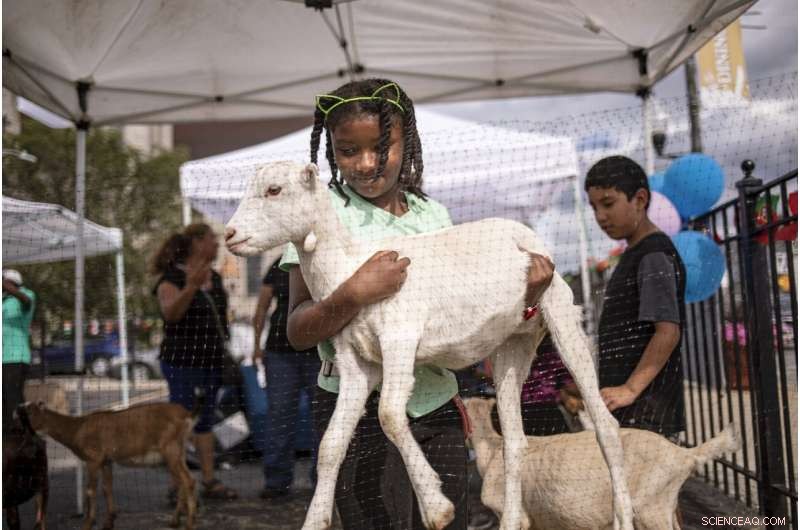
En ce vendredi, 16 août 2019, photo, une fille porte une chèvre au marché fermier du Inner-city Muslim Action Network (IMAN) à Chicago à Chicago à Chicago. Atlanta, Chicago et d'autres grandes villes du pays adoptent une approche à plusieurs volets pour apporter une alimentation saine aux « déserts alimentaires, " principalement des quartiers populaires situés à des kilomètres du supermarché le plus proche. Leurs initiatives incluent des stands de produits frais dans les gares de transports en commun, jardins urbains, et des partenariats avec des entreprises de covoiturage pour transporter les résidents vers les épiceries et les marchés de producteurs. L'objectif est de réduire les troubles de santé et de responsabiliser les communautés à faible revenu. (Photo AP/Amr Alfiky)
Le jardin des Rashids pousse à la South Chicago Farm, un site de 14 acres (5,6 hectares) développé en 2015. C'est l'une des huit fermes de ce type à Chicago exploitées par l'association à but non lucratif Urban Growers Collective.
A Atlanta, beaucoup de tomates, les pêches et les poivrons trouvés dans les bacs des marchés Fresh MARTA proviennent d'aliments cultivés en ville et dans les fermes voisines, dit Hilary King, des marchés de producteurs communautaires à but non lucratif, qui s'associe à la Metropolitan Atlanta Rapid Transit Authority pour gérer les stands. Lancé en 2015, les marchés MARTA sont situés à différentes stations au cours de la semaine.
"Nous ne pouvons pas nous fier aux méthodes de vente au détail traditionnelles, " a déclaré Mario Cambardella, directeur de l'agriculture urbaine d'Atlanta.
Les organisations à but non lucratif se sont également associées à la société de covoiturage Lyft pour offrir à 300 familles à faible revenu des trajets à prix réduit vers les marchés de producteurs et les épiceries d'Atlanta. Le programme pilote de six mois, appelé Access AgLanta, a commencé le 1er juin inspiré par un partenariat Lyft similaire à Washington, D.C.
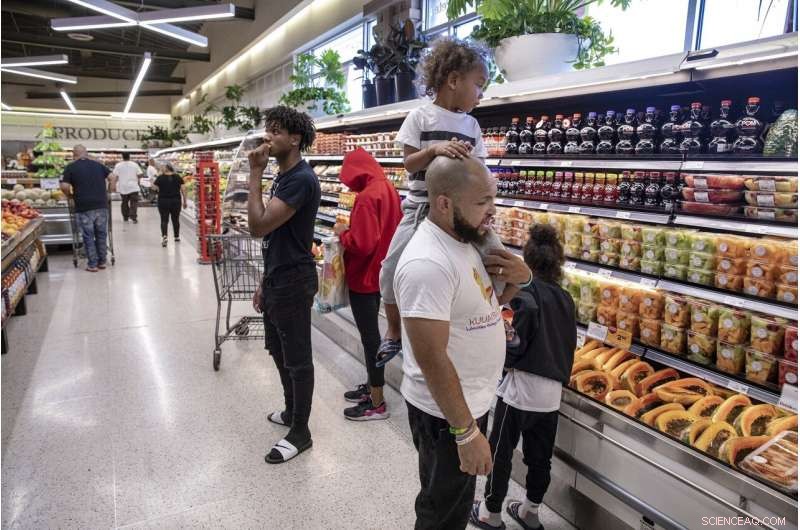
En ce jeudi, 15 août, 2019, photo, Christophe « Chien fou » Thomas, porte son fils, Rian Gatewood-Hillestad, en faisant du shopping au Pete's Market dans le quartier Garfield de Chicago. Thomas, qui a grandi dans le quartier d'Altgeld Gardens dans le côté sud de Chicago, a déclaré qu'il souffrait de "" trouble de l'alimentation du désert alimentaire, ' où tout ce que vous pouvez vous permettre de manger, ce sont des bonbons." Thomas et sa femme, faire un voyage hebdomadaire à l'extérieur de leur quartier dans ce magasin, que sa femme décrit comme "les aliments entiers noirs ou hispaniques". (Photo AP/Amr Alfiky)
"Ce que nous avons souvent entendu au fil des ans, c'est que le transport est un énorme obstacle à l'accès à la nourriture, " a déclaré Alysa Moore, responsable de programme pour Georgia Fresh For Less, which provides state residents who receive food stamps with financial assistance to shop at farmers markets.
Eleby relies heavily on the transit platform markets. Sans eux, il a dit, he'd be forced to rely on a small scattering of stores in his low-income neighborhood in southwest Atlanta where he said he has to smell food or examine it for mold before buying it. The food there, il a dit, isn't "like it's supposed to be."
Depuis 2015, roughly 22% of Atlanta's population was living in a low-income community more than a mile from a food store, according to the U.S. Department of Agriculture.
À Chicago, that number is 5%. Relativement, the number in Seattle is 7.8%; Washington, D.C., 6.4%; Baltimore, 4.3%; and Milwaukee, 3.5%, selon l'USDA.
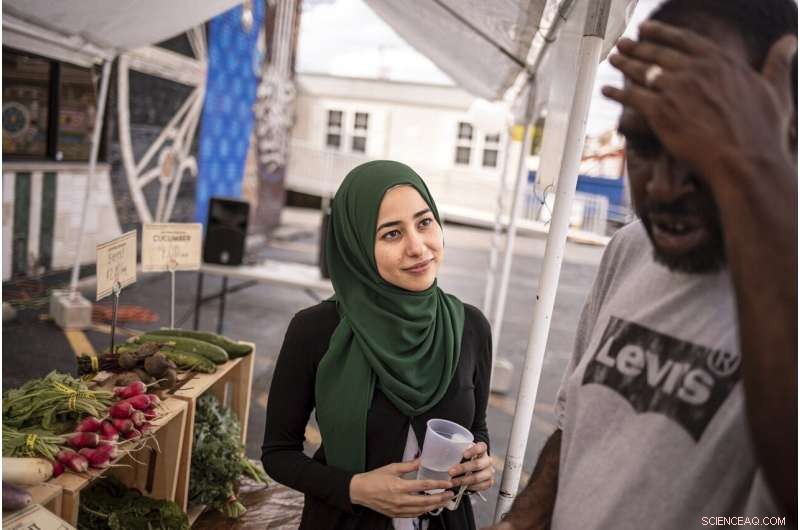
En ce lundi, 19 août 2019, photo, dietitian Heba Abdel Latief, droit, talks to her patient, Richard Ware, at Inner-city Muslim Action Network's (IMAN) farmers market in Chicago. IMAN offers free of charge dietitian visits at their health clinic. Atlanta, Chicago and other large cities across the country are taking a multi-pronged approach to bringing healthy diets to "food deserts, " mostly low-income neighborhoods located miles away from the nearest supermarket. The goal is to reduce health disorders and empower low-income communities. (AP Photo/Amr Alfiky)
Christopher "Mad Dog" Thomas, 34, who grew up in the Altgeld Gardens neighborhood on Chicago's South Side, said he has suffered from "'food desert eating disorder, ' where all you can afford to eat is candy."
Thomas and his wife, Kathryn Gatewood, make a weekly trip outside their neighborhood to a store called Pete's Supermarket, which Kathryn Gatewood describes as "the black or Hispanic Whole Foods."
"We spend almost 40% of our paychecks combined to ensure a healthier diet for our kids, " elle a dit, adding that it is a better alternative than buying bad food from the "dusty shelves" of corner stores in Englewood.
The Chicago nonprofit Inner-City Muslim Action Network has launched "The Corner Store Campaign" to change that.
Sami Defalla, who runs the Morgan Mini Mart in Englewood, has been an active partner with the campaign for more than two years. Defalla has created a "green zone" in the store where shoppers can purchase inexpensive fresh fruits and vegetables.
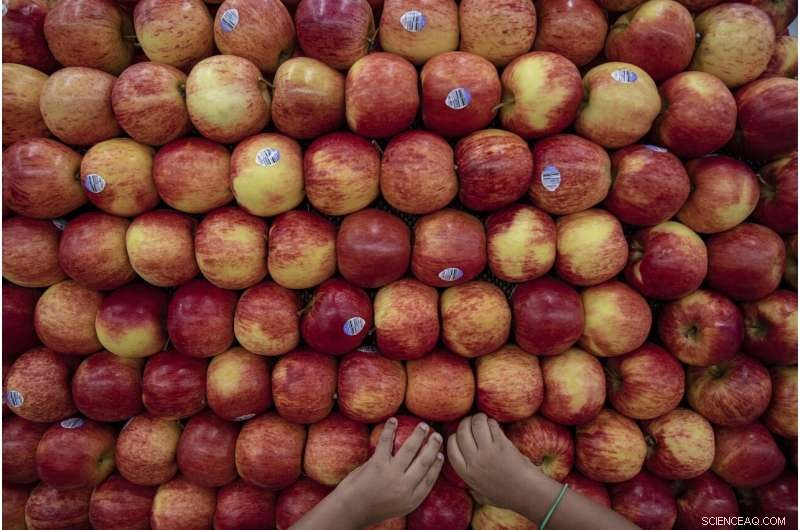
En ce jeudi, Aug. 15, 2019, photo, Rian Gatewood-Hillestad plays with apples while shopping with his parents at Pete's Market in Chicago's Garfield Neighborhood. Christopher "Mad Dog" Thomas, Rian's father, organizes a weekly family trip outside their neighborhood to Pete's Supermarket, which his wife describes as "the black or Hispanic Whole Foods." (AP Photo/Amr Alfiky)
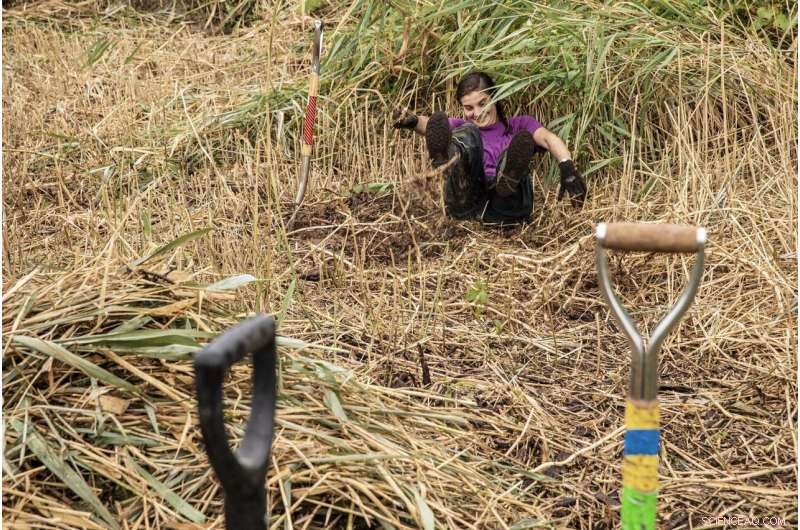
En ce samedi, 17 août 2019, photo, Viviana Gentry Fernandez-Pellon, co-founder of Cooperation Operation, smiles as she falls on her back while working to clear section of high weeds and brush to create a new space for an organic produce garden in the Pullman neighborhood of Chicago. Large cities across the country are using a multi-pronged approach to bring healthy diets to "food deserts, " mostly low-income neighborhoods located miles away from the nearest supermarket. They hope not only to reduce rates of diabetes, high blood pressure and obesity, but to encourage community activism and empowerment. (AP Photo/Amr Alfiky)
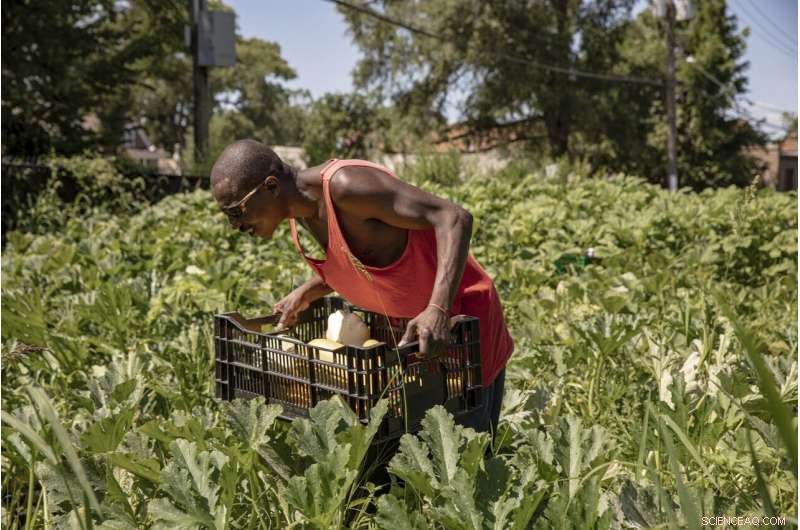
En ce vendredi, Aug. 9, 2019, photo, Stanford Williams works at the Growing Home, Inc. farm in Chicago's Englewood neighborhood. Large cities across the country are using a multi-pronged approach to bring healthy diets to "food deserts, " mostly low-income neighborhoods located miles away from the nearest supermarket. They hope not only to reduce rates of diabetes, high blood pressure and obesity, but to encourage community activism and empowerment. (AP Photo/Amr Alfiky)
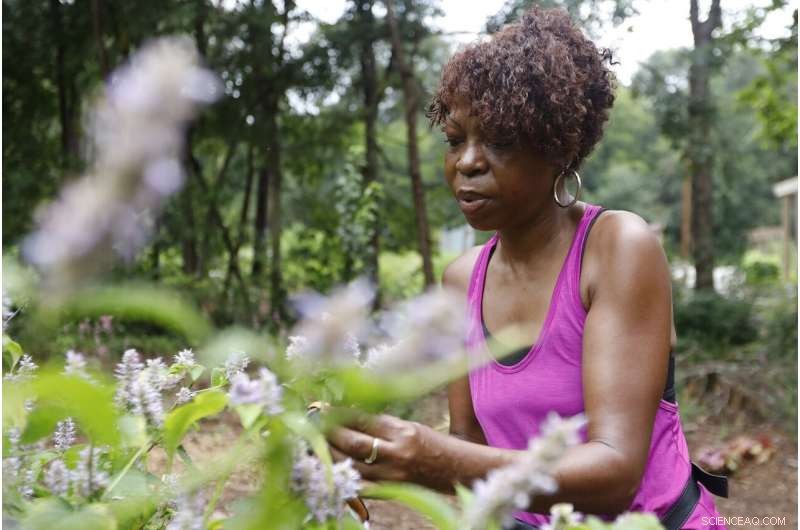
En ce vendredi, July 19, photographies 2019, Celeste Lomax harvests anise hyssop plants in a community garden at the Urban Food Forest at Browns Mill in Atlanta. Lomax lives in a low-income neighborhood in south Atlanta with limited access to healthy food. She said the community gardens provide an alternative food source for volunteers and neighborhood residents. (AP Photo/Andrea Smith)
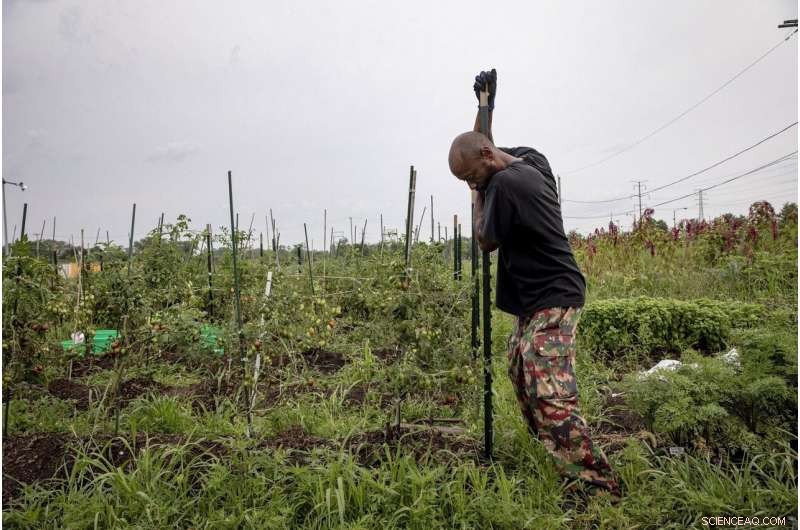
En ce mardi, 20 août 2019, photo, Kamau Rashid works in his garden in the South Chicago Farm on Chicago's south side. Rashid and his wife Safia, started urban farming almost 14 years ago, when their oldest son was 3 years old. "We're doing this out of us feeling the need and responsibility toward our community." Safia Rashid, mentionné. Living in a neighborhood with little access to healthy foods, so-called food deserts, they set out to fight what they called "food apartheid." (AP Photo/Amr Alfiky)
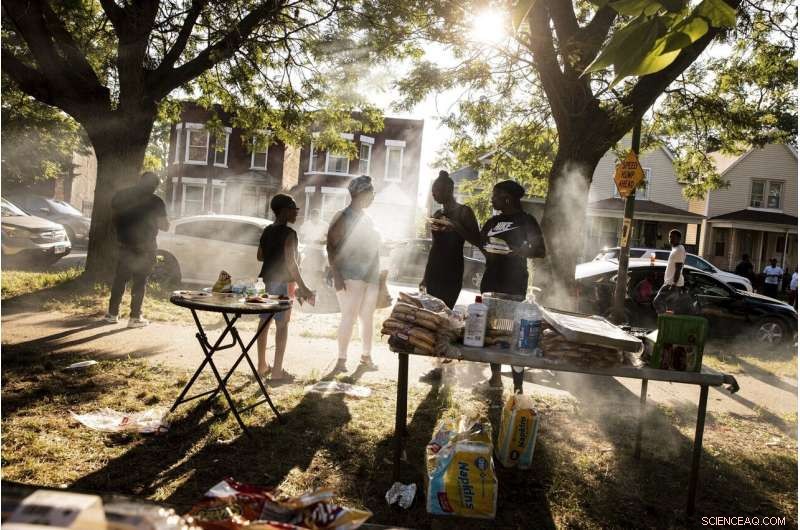
En ce jeudi, 1er août 2019, photo, people gather for a barbecue in a vacant lot hosted by Inner-city Muslim Action Network's (IMAN) in Chicago's neighborhood of West Englewood. IMAN seeks to educated people on proper nutrition in a section of the city with low access to nutritional foods. (AP Photo/Amr Alfiky)
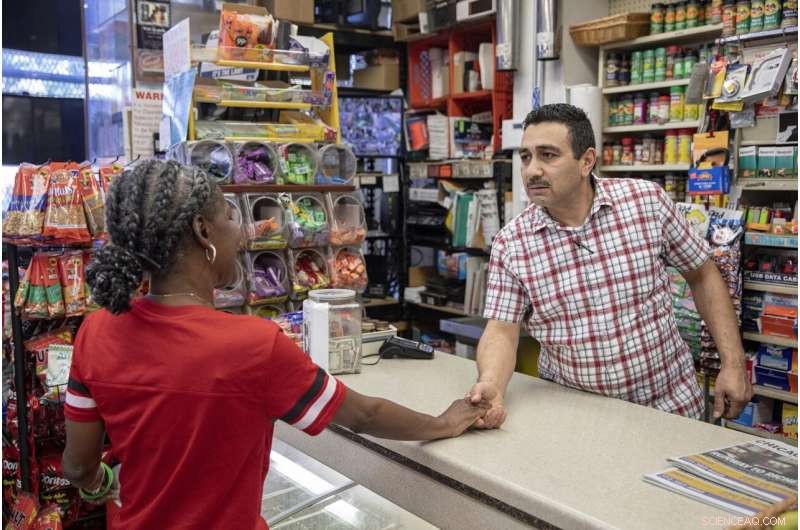
En ce lundi, 19 août 2019, photo, Sami Deffala, owner of the Morgan Mini Mart in Chicago's Englewood neighborhood, droit, offers his condolences to a customer who lost her 17-year-old son recently to gun violence in Ohio. Sami Defalla, who runs the small Mart in Englewood, has been an active partner with the campaign for more than two years. Defalla has created a "green zone" in the store where shoppers can purchase inexpensive fresh fruits and vegetables. (AP Photo/Amr Alfiky)
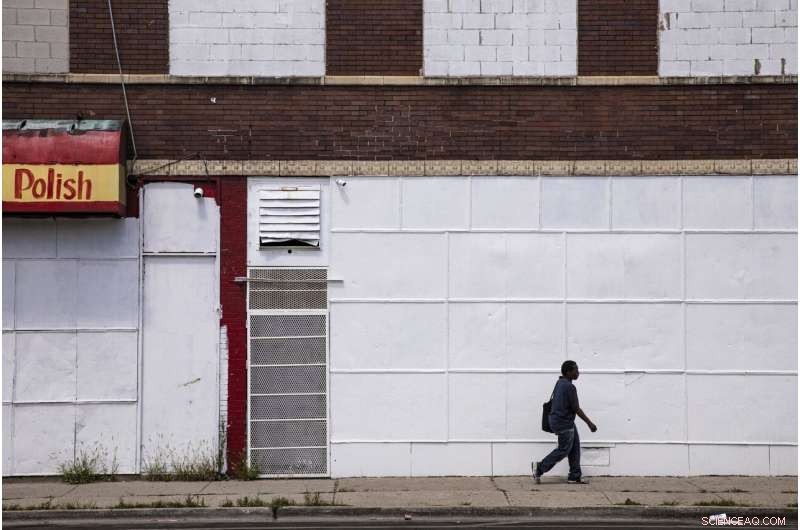
En ce vendredi, Aug. 9, 2019, photo, a man walks on a sidewalk past boarded up business in Chicago's Englewood neighborhood. Depuis 2015, roughly 22% of Atlanta's population was living in a low-income community more than a mile from a food store, and in Chicago, that number is 5%, according to the U.S. Department of Agriculture. (AP Photo/Amr Alfiky)
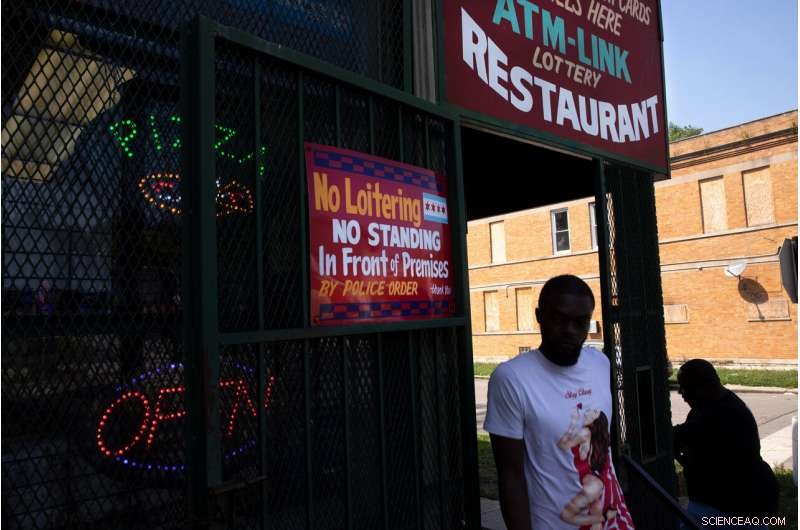
En ce lundi, 19 août 2019, photo, two people pass though the doorway of the Morgan Mini Mart in Chicago's Englewood neighborhood. Sami Defalla, who runs the Morgan Mini Mart in Englewood, has been an active partner with the campaign for more than two years. Defalla has created a "green zone" in the store where shoppers can purchase inexpensive fresh fruits and vegetables. (AP Photo/Amr Alfiky)
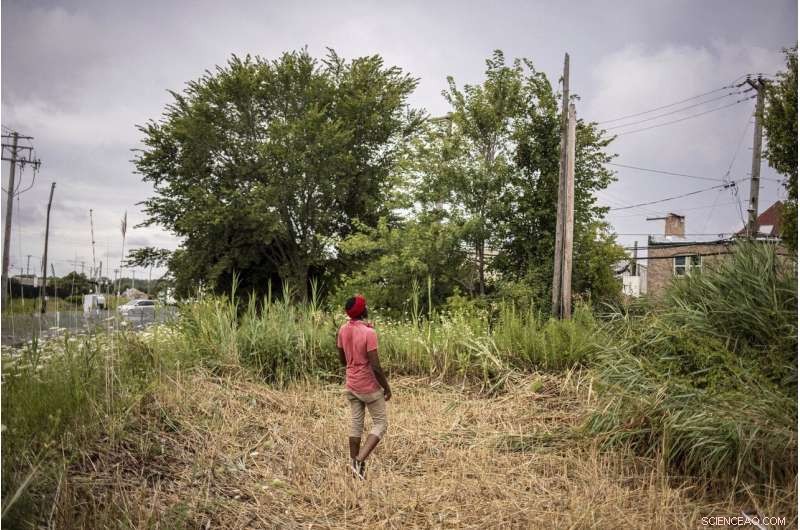
En ce samedi, 17 août 2019, photo, Olisaemeka Okakpu walks into a section of public land consisting of high weeds and brush, that his organization Cooperation Operation plan to clear for an organic produce garden in the Pullman neighborhood of Chicago. (AP Photo/Amr Alfiky)
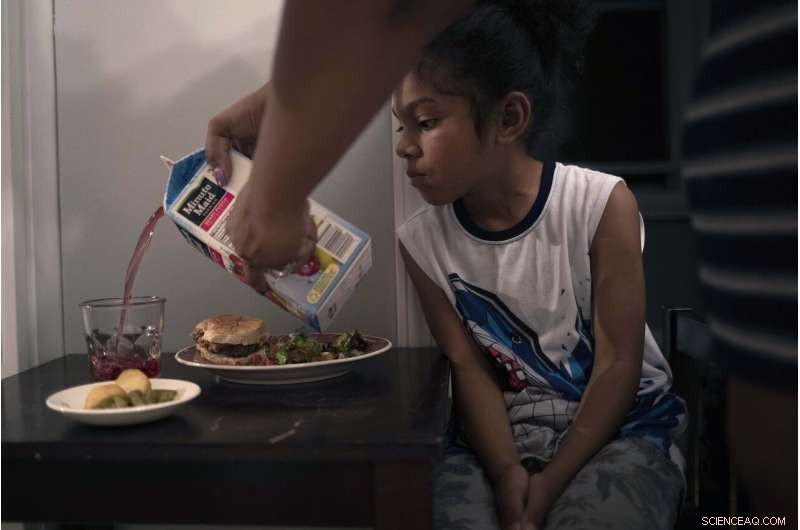
En ce jeudi, Aug. 15, 2019, photo, Kathryn Gatewood pours juice into a glass for her son, Tracy at their home in Chicago's Englewood Neighborhood. "We spend almost 40% of our paychecks combined to ensure a healthier diet for our kids, " elle a dit, adding that it is a better alternative than buying bad food from the "dusty shelves" of corner stores in Englewood. (AP Photo/Amr Alfiky)
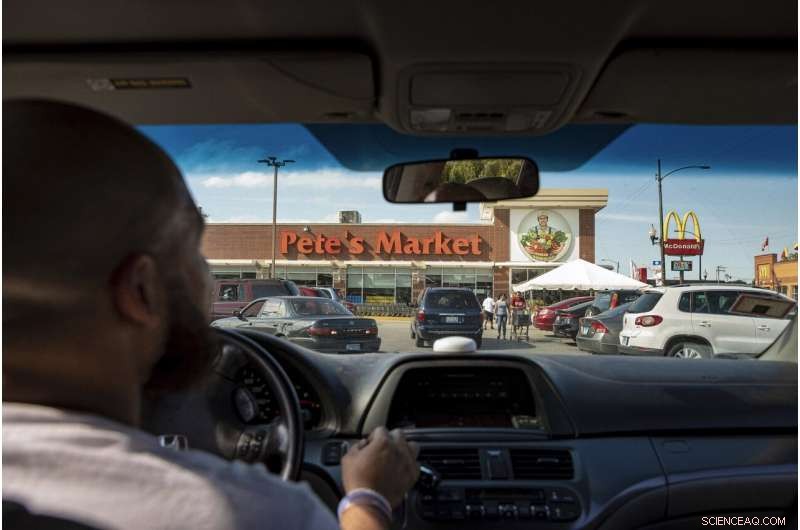
En ce jeudi, Aug.15, 2019, photo, Christopher "Mad Dog" Thomas, drives into Pete's Market in Chicago's Garfield Neighborhood. Thomas organizes a weekly family trip outside their neighborhood to the store, which his wife describes as "the black or Hispanic Whole Foods." (AP Photo/Amr Alfiky)
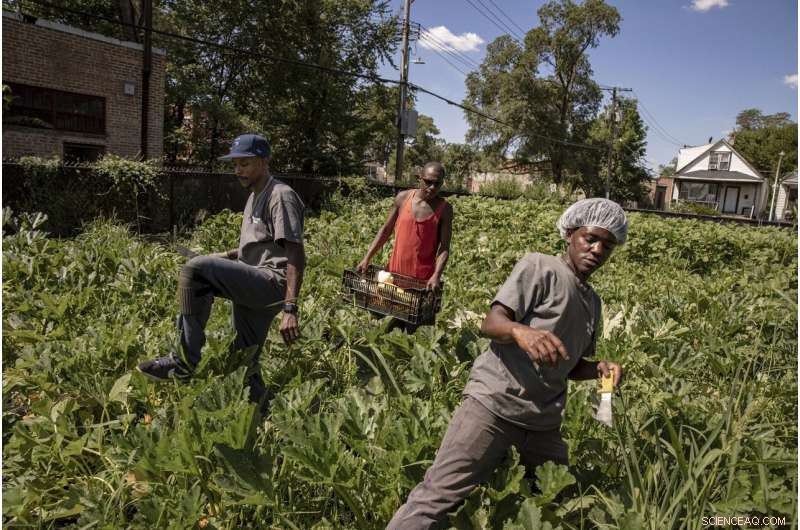
En ce vendredi, Aug. 9, 2019, photo, Maurice McCary, la gauche, Stanford Williams, center and Torreyon Simmons, work at the Growing Home, Inc. farm in Chicago's Englewood neighborhood. Large cities across the country are using a multi-pronged approach to bring healthy diets to "food deserts, " mostly low-income neighborhoods located miles away from the nearest supermarket. They hope not only to reduce rates of diabetes, high blood pressure and obesity, but to encourage community activism and empowerment. (AP Photo/Amr Alfiky)
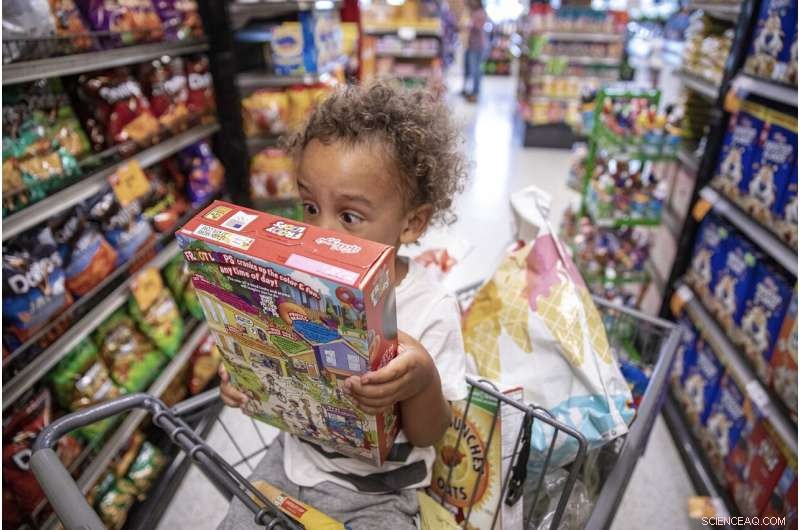
En ce jeudi, Aug. 15, 2019, photo, Rian Gatewood-Hillestad reacts to cartoons printed on a cereal box while shopping with his parents at Pete's Market in Chicago's Garfield neighborhood. Christopher "Mad Dog" Thomas, Rian's father, organizes a weekly family trip outside their neighborhood to Pete's Supermarket, which his wife describes as "the black or Hispanic Whole Foods." (AP Photo/Amr Alfiky)
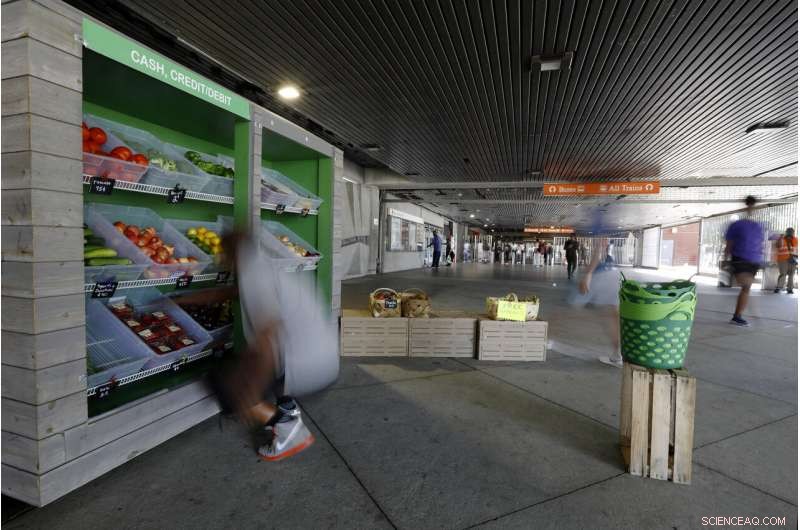
En ce mardi, 20 août photographies 2019, people pass by the Fresh MARTA Market in the West End transit station in Atlanta. The Metropolitan Atlanta Rapid Transit Authority and the Atlanta nonprofit Community Farmers Markets partner to run the stands, which sell food from some Atlanta urban farms. (AP Photo/Andrea Smith)
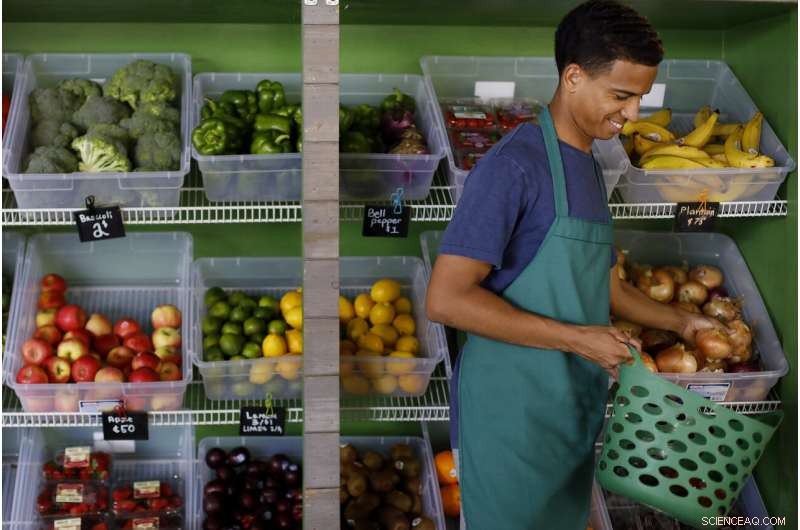
En ce mardi, 20 août photographies 2019, volunteer Xavier Lopez helps a customer select fruits and vegetables at the Fresh MARTA Market at the West End transit station in Atlanta. The Metropolitan Atlanta Rapid Transit Authority and the Atlanta nonprofit Community Farmers Markets partner to run the stands, which provide a healthy food source for people living in food deserts.(AP Photo/Andrea Smith)
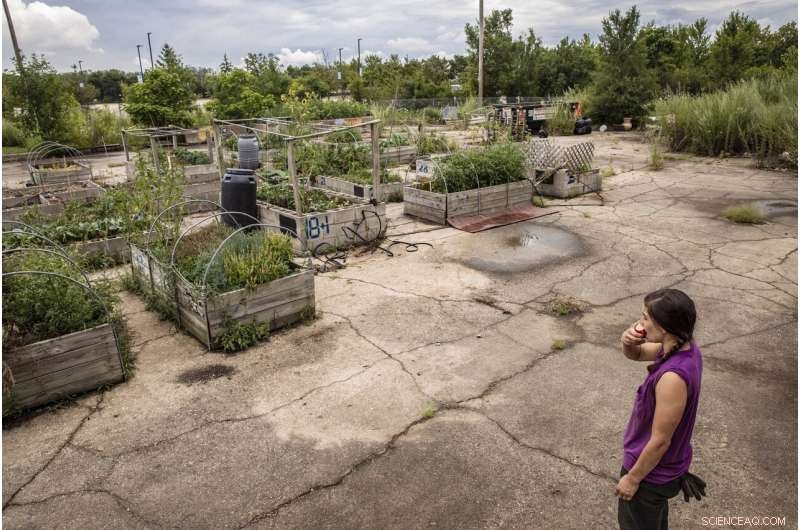
En ce samedi, 17 août 2019, photo, Viviana Gentry Fernandez-Pellon, co-founder of Cooperation Operation, eats an apple as she looks over the successful urban community garden in Chicago's Pullman neighborhood. (AP Photo/Amr Alfiky)
"I wish I had a bigger platform to offer more ... to my customers, " Deffala said.
The Muslim Action Network also operates a health clinic where patients can see a dietitian free of charge and receive coupons for free produce at the nearby farmers market. Every Friday, the group hosts a farmers market where residents can connect with local urban farmers.
As a volunteer in a community garden in Atlanta, Celeste Lomax is finally able to take fresh produce home to her low-income neighborhood, which is located about 4 miles (6.4 kilometers) away from the nearest supermarket.
"We have a right to eat healthy like everyone else does, " elle a dit.
© 2019 La Presse Associée. Tous les droits sont réservés.